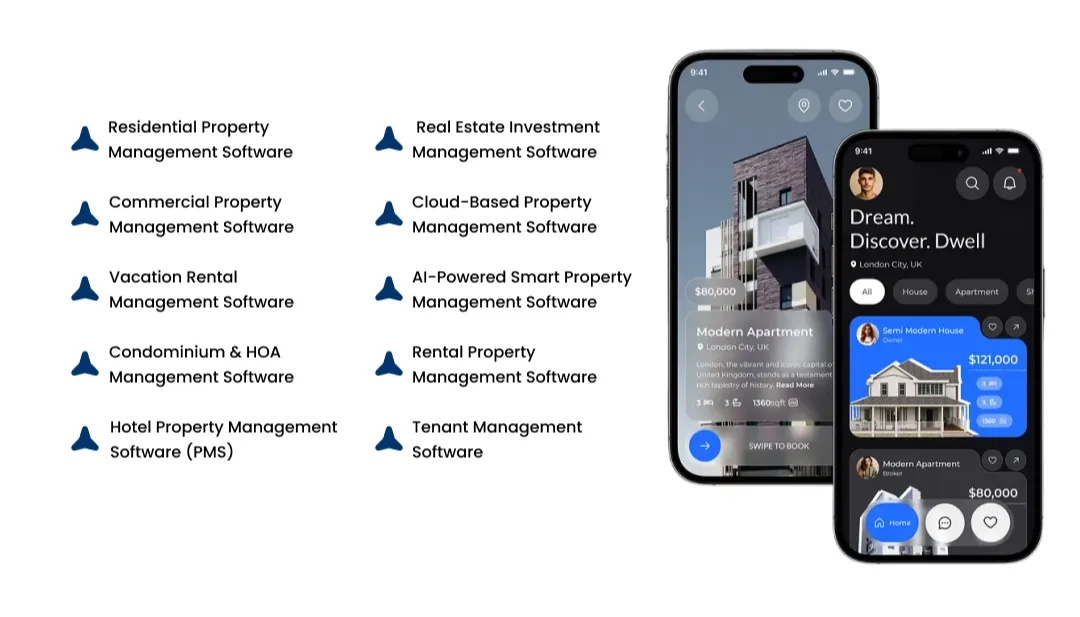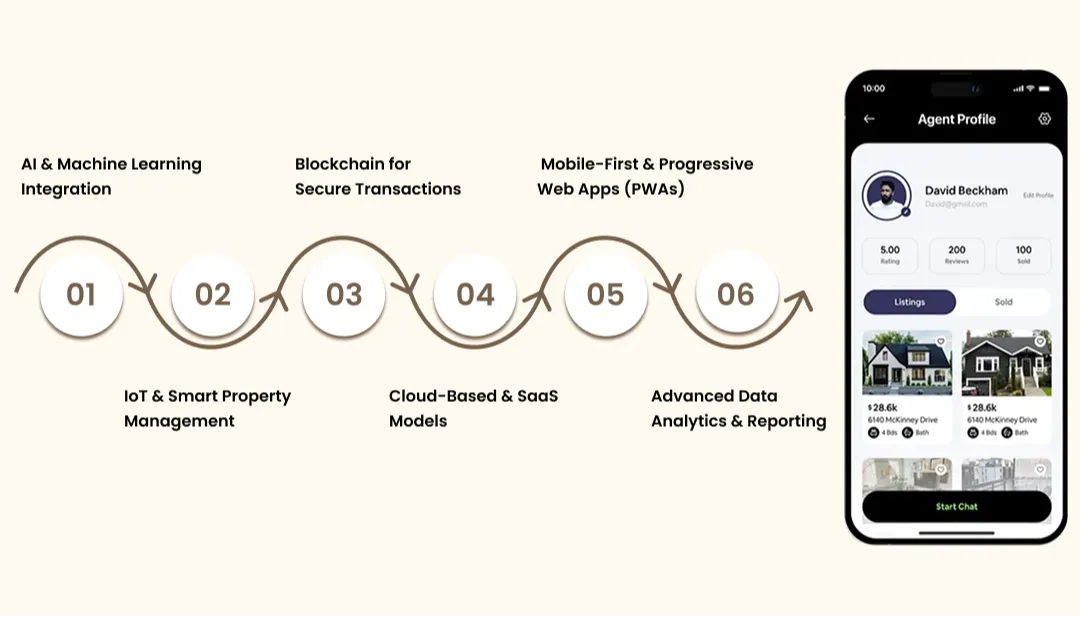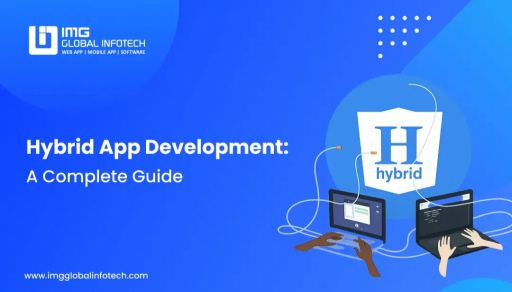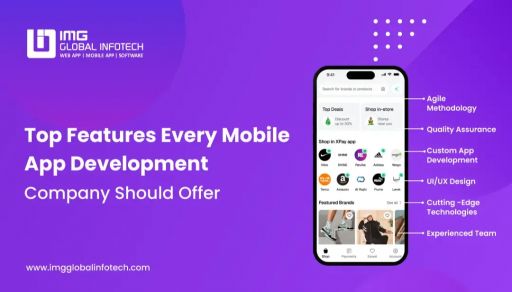Property Management Software Development Guide: Features, Cost & Strategy
Neeraj Rajput
Jun 11, 2025

The global property management software market has rapidly grown, primarily because of digitalization's impacts on the real estate sector. The market valuation stood at $3.04 billion in 2021 and was estimated to grow at a CAGR of 7.8%, reaching $5.02 billion by 2029. Companies are purchasing tailored property management software solutions to improve efficiency because of increasing demand for automated tenant management, online rental collections, and real time data analyses.
The estimate for property management software development depends on multiple factors, including the desired features, applied technological frameworks, the development team, and possible other integrations. If you are an estate agency, landlord, or property management agency, understanding the estimate of the real estate management development cost will assist you in formulating a sound budget.
In this blog, we will outline the cost estimates and provide key tips and recommendations for designing a fully functional property management solution.
Overview of Property Management Software
A dashboard was designed to show the mind-numbing processes in real estate, such as tenant management, financial reporting, maintenance tracking, and rent collection. With the help of this software, tasks can be automated, communication improved, and real time feedback provided. All combined, these solutions help improve a business's operational efficiency. Instead of managing every property, lease, and payment, users can execute all these processes from one screen.
Benefits of Property Management Software Development
As mentioned above, property management software is very helpful in improving efficiency, automating processes, and satisfying tenants in an ever-competitive real estate market. Its main function is extracting nonproductive legwork for property managers and landlords and enabling real estate companies to expedite property workflows.
1. Streamlined Tenant & Lease Management
Keeping track of a multitude of tenants' leases and renewals is, without a doubt, one of the toughest challenges any business manager has to deal with. An example of what we are referring to is property management software.
2. Efficient Rent Collection & Financial Management
Automating reminders, document storage, and lease tracking work together to decrease risk exposure and compliance complications. Cash flow is substantially improved, and the automated reminders for rent payments greatly reduce overdue payments, along with secure payments and comprehensive payment reporting.
3. Faster Maintenance Request Handling
Other areas include strong functionalities for effortless invoice, expense, and revenue tracking and controlling through the built-in accounting features. To increase tenant satisfaction, this application gives the ability to tenants to issue maintenance requests which the property manager can instantly assign tasks, monitor progress, and provide quick solutions.
4. Improved Communication & Notifications
Automated emails, SMS, application notices and others improve tenant relations as they can always receive updates about policy changes, maintenance reviews, and due date for rent payments.
5. Real-Time Reporting & Analytics
Property managers are supported in monitoring their occupancy rates, rental cycles, and financial results with advanced business intelligence strategies which improves decision-making and management of the entire portfolio.
6. Remote Access & Mobile Convenience
Using Cloud technology, tenants and landlords are able to use the property management software through mobile and web applications making it possible for them to manage business round the clock.
Also Read - How To Build A Real Estate App
Types of Property Management Software

These are the four most formulated divisions, but there is no limit of commercial property management software that assists generally for most group users like as restaurant operators and commercial, residential, vacation, and property managers.
1. Residential Property Management Software
With sophisticated residential property management software development agencies, landlords, and even property managers easily manage rental apartments, homes, and complexes. In addition to tenant and rent spend screening, it includes a multitude of housekeeping and maintenance services for comprehensive support in residential property management.
2. Commercial Property Management Software
This software addresses particular requirements for the management of retail spaces, shared office space buildings, and even industrial and warehouse properties. Econometric contracting, expenditure reporting, and space optimization can all be done by the property administrator. It also assists property owners in managing complex leases, entailing sophisticated billing systems.
3. Vacation Rental Management Software
It caters to short term facilities such as hotels, resorts, and even Airbnb's. It allows for reservation management, automated and effective check-in services, provides dynamic pricing, and integrates with other commercial property management applications like Booking.com, Expedia, and Airbnb.
4. Condominium & HOA Management Software
This type of real estate management software is used by managers of condominium owners and homeowners associations. These managers are responsible for the maintenance of common areas, supervision of fee collection, and development of community rules. It helps council members to operate more efficiently with event management and voting features.
5. Hotel Property Management Software (PMS)
Hospitality providers use PMS systems to automate billing, guest servicing, and housekeeping and room assignment tracking. More advanced systems even automate customer service pre-sale actions in addition to providing revenue management solutions, as well as loyalty program options.
6. Real Estate Investment Management Software
Some real estate firms also use the best property management software for small landlords to conduct portfolio reviews, monitor expenditures, and perform asset management as part of an investment strategy. This software enhances real estate investment by computing ROI, analyzing the market, and forecasting trends.
7. Cloud-Based Property Management Software
This type helps property managers streamline their remote operations; it also lowers costs for IT infrastructure and improves security and multi-device access for landlords and tenants together with instant property information disclosure.
8. AI-Powered Smart Property Management Software
Automation through the use of chatbots for tasks such as tenant support, predictive maintenance, and energy management improves the efficiency of real-time data analysis. This integration of AI and IoT also adds value to operational efficiency.
9. Rental Property Management Software
With advanced rental property management software solutions, landlords and leasing agencies can seamlessly oversee rental units, streamline leasing workflows, and monitor property performance in real time. From handling rental listings and automated rent collection to tracking lease agreements and maintenance requests, the software offers end-to-end control over residential and commercial rental properties.
10. Tenant Management Software
Modern tenant management software empowers property managers and landlords to efficiently handle tenant-related operations, from onboarding and background checks to rent payment tracking and issue resolution. It offers tools for tenant communication, document storage, lease tracking, and service requests,ensuring a smooth and transparent relationship between landlords and tenants.
Also Read - 10 Best Real Estate Application For Buyers & Sellers In 2026
Steps to Build a Property Management Software
Developing a robust property management software solution requires a strategic approach that combines business understanding with technical execution. Whether you're a real estate agency, property owner, or software entrepreneur, here are the essential steps for successful property management software development:
1. Define Your Business Goals and Target Users
Start by identifying the core purpose of your software. Will it be used by landlords, tenants, property managers, or all of them? Clarify what problems you're solving, such as rent tracking, lease management, maintenance requests, or accounting automation.
2. Conduct Market Research
Analyze your competitors and current market trends. Look into the most-used property management platforms and evaluate their features, strengths, and gaps. This insight will help you build a product that stands out.
3. Finalize the Feature List
Based on your goals and research, determine the must-have features. Common functionalities include:
-
Property listing management
-
Tenant and lease tracking
-
Rent collection and payment gateway integration
-
Maintenance request handling
-
Financial reporting and analytics
-
Mobile accessibility for users on-the-go
4. Choose the Right Technology Stack
Select technologies that support scalability, security, and performance. Depending on your target platform (web, mobile, or both), you might use:
-
Frontend: React, Angular, or Flutter
-
Backend: Node.js, Django, Laravel
-
Database: MySQL, PostgreSQL, MongoDB
-
Cloud Hosting: AWS, Google Cloud, or Azure
5. Design a User-Friendly UI/UX
A clean, intuitive interface enhances user satisfaction. Design with both tech-savvy and non-tech users in mind. Create wireframes and prototypes to validate design ideas before development.
6. Start Development (MVP First)
Begin with a Minimum Viable Product (MVP) containing core features. This allows you to test your idea in the real world with less investment and gather early feedback for improvements.
7. Test Thoroughly
Ensure the software is bug-free, secure, and responsive across devices. Perform functional, usability, and performance testing to guarantee a smooth user experience.
8. Launch and Monitor
Deploy your property management software to the market. Use analytics tools to monitor user behavior and app performance. Collect feedback for future updates and improvements.
9. Maintain and Upgrade
Post-launch, keep your software updated with new features, security patches, and user-requested enhancements. Regular maintenance ensures long-term success and user retention.
How Much Does Property Management Software Cost?
A property management software development cost includes a lot of automation, some of which may be complex in design while others may have a single, straightforward feature. The cost to develop a property management software is roughly estimated as follows:
- Basic Software ($15,000 – $30,000): Includes primary functionalities like tenant management, basic reporting, and rent tracking.
- Mid-Level Software ($20,000 – $40,000): Includes mobile apps, automated lease management, maintenance reporting and financial reporting.
- Enterprise-Level Software ($30,000 – $50,000+): More advanced software with AI-based insights, IoT integration, security from Blockchain technology, and support for multiple platforms.
Factors Influencing Property Management Software Development Cost
Real estate management software development pricing is contingent on features, used technology, and the complexity of lease management software development. Below, outline the cost factors that determine software development costs:
1. Features & Functionalities
In algorithms that estimate the cost of property management software development, its complexity and number of features play a crucial role. Basic tenant management software that allows rent payment collection is a lot cheaper than those with advanced features like AI analytics, automated lease renewals, and smart IoT-enabled property management.
2. Platform & Deployment
The property management software development cost variations stem from the client's choice of a web, mobile, or cross-platform solution. Also, SaaS provided on the cloud comes with maintenance, unlike on-premise software, which has a higher initial investment cost to develop property management software.
3. UI/UX Design
While a user-friendly, visually appealing interface enhances the user experience, more creative processes are needed in UI/UX designs, wireframing, and including custom rest guarantees above certain thresholds. Base design templates have a lower cost compared to custom design templates.
4. Technology Stack
Selection of programming languages, frameworks, and third-party APIs influences the cost of rental Property management software development. While performance can be improved by using React, Node.js, Python, or cloud services, highly qualified developers are required, which increases the cost to develop real estate management software.
5. Development Team & Location
In-house developers work on specific projects for a set cost to develop property management software. This is more expensive than hiring remote developers from low-cost countries like India or Eastern Europe. The amount charged for developing property management software differs among seasoned professionals due to the intricacy of the work and the time billed.
6. Integration with Third-Party Tools
The inclusion of payment gateways, CRM, IoT and AI Chatbots increases the complexity of integration and subsequently raises the cost to develop property management software .
7. Security & Compliance
Extra cost to build property management software for implementing security features associated with encryption, compliance with real estate regulations, and the protection of sensitive information.
8. Ongoing Maintenance & Updates
Property management software costs, algorithm bugs, feature requests, and server hosting all factor into the long-term cost of lease management software.
Also Read - How To Build A Real Estate App Like Zillow Or Trulia
Future Trends That May Impact Real Estate Software Development Costs

These five trends summarize the most recent developments in PMS concerning relations with tenants, artificial intelligence innovations, the Internet of Things, new approaches in cloud security, and blockchain technology.
1. AI & Machine Learning Integration
Analytics that automate data collection and analysis analyze rent values, occupancy rates, and the need for maintenance and servicing activities. While big-data systems improve the performance of the PMS system, they do come with a higher processing power demand.
2. IoT & Smart Property Management
Smart locks, energy consumption monitoring, and predictive maintenance fall under IoT devices whose use is enabled by higher integration expenses alongside more expensive hardware costs. Many cloud IoT solutions offer the Internet as their primary operating network but as a trade-off for secure and real-time analytics access for many devices, which increases the expenses for the system.
3. Blockchain for Secure Transactions
The blockchain guarantees transparent lease contracts with enhanced security and automated payments; however, integrating Contract Management Software can reduce the complexity and cost associated with implementing smart contracts in bespoke property management systems.
4. Cloud-Based & SaaS Models
More organizations have adopted cloud-based proprietary management systems to leverage the flexibility and accessibility of the systems. These models, both subscription and perpetual SaaS, will, in one way or another, affect the bottom line due to the offered automatic system updates and expenditures on cybersecurity.
5. Mobile-First & Progressive Web Apps (PWAs)
Mobile property management comes with improved accessibility thanks to the creation of cross platform mobile apps or PWAs. Nevertheless, there are issues that need to be solved concerning the higher development complexity and costs, seamless performance, real-time synchronization, and offline availability.
6. Advanced Data Analytics & Reporting
AI-driven analytics for real estate data calculates in-seat occupancy, rental rates, and maintenance needed for the tenant. Use of such analytics requires efficient, yet highly advanced, big data processing software with considerable processing capabilities.
15 Key Features of Real Estate Management Software
This real estate management software is essential for managing activities and workflows in an organization and enables ease in the real estate management column. Below the section have some features that allow better property management.
1. Tenant & Lease Management
This function helps the administrators to track the particulars of the tenants, lease amalgamations, renewals, moving-in or moving-out dates, or any other relevant information for better functioning.
2. Online Rent Collection
Minimizes the chance for late fees. Processes payment through verified payment processing systems, ensuring payment is made on time while lowering manual tasks that requires time.
3. Maintenance Request Tracking
Users are enabled to submit requests pertaining to maintenance through the Web, enabling the managers to quickly allocate, track, and resolve issues.
4. Accounting & Financial Management
These features are made to make bookkeeping much easier and efficient by combining all expenses, taxes, invoicing, and even revenues into one system, improving cash flow tracking and reporting.
5. Vacancy & Listing Management
The advertising system is aided by the management of the inquiries and applications for the vacant units, thus improving the occupancy and decreasing the turnaround time of purpose-built assets.
6. Document Storage & Management
Secures and organizes important documents like agreements, records of tenants, payments, receipts, and other legal documents for easier access and improved security.
7. Communication & Notifications
Set email, SMS, or push notifications to alert users of when rent, maintenance, and lease renewals are to occur via automated reminders.
8. Reporting & Analytics
Permits instant analysis of performance metrics, rental patterns, and other financial figures, occupancy and other components of properties for better decision making processes.
9. Mobile Accessibility
With a mobile responsive website or dedicated app, even landlords and tenants can utilize features and functionalities of the real estate management software wherever they are.
10. Integration with Third-Party Tools
This makes the system smarter by allowing the integration of accounting software, CRM systems, payment interfaces, IoT devices, and even AI chatbots.
11. AI-Powered Chatbots & Support
With AI incorporated into the platform, the chatbot can assist with topics related to rent, servicing, or maintenance, thereby improving the service and response times.
12. IoT & Smart Property Management
Enables automated locking systems, energy planning, and enhanced security for effective surveillance of the property with regard to tenant safety and comfort.
13. Cloud-Based Accessibility
A cloud-based system offers an inexpensive IT backbone for the service providers because of its real-time data, protection and multi-device synchronization.
14. Multi-Property Management
Preferred by real estate agencies that require effortless management of various properties, tenants, and finances all from one location.
15. Compliance & Legal Management
Reduction of legal risks through ensuring that properties comply with all rental agreements, taxes, safety requirements, and other applicable laws.
Why Choose IMG for Property Management Software Development?
IMG Global Infotech designs business solutions that include fully customizable and scalable multi-functional property management system software designed for real estate companies. Incorporating modern technologies such as seamless integration and UI focus enables smooth processes from tenant relations to finance management. Our experienced developers build secure cloud-based platforms integrating AI for enhanced decision-making through platform insight. Partnering with IMG guarantees cost-effective and quality responsive service with superb service level agreements in real estate software development. Contact IMG today for effective property management solutions.
Conclusion
Over time, real estate managers have struggled with certain operations, leading to the development of new technology in the focus area of property management. Property management software costs range from $15,000 to $50,000+, depending on the complexity of the features, technology, and approach. To mitigate financial risks, consider MVP development, outsourcing, and scalable architecture. An experienced real estate app development company will provide a sophisticated, secure, and scalable solution. Investing in efficient custom property management software, operational efficiency, client satisfaction, and effective business growth management improves the always competitive real estate industry.
Neeraj Rajput is the co-founder of a leading IT company with over a decade of experience in technology consulting, product development, and digital transformation. With a passion for solving complex business challenges through smart tech solutions, he shares insights on innovation, leadership, and the evolving IT landscape












